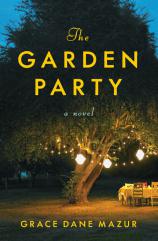The Garden Party
Review
The Garden Party
THE GARDEN PARTY by Grace Dane Mazur is a beautifully constructed novel, replete with flowing prose, a complex cast of characters, and thrilling secrets revealed on nearly every page.
Two families who cannot feel more different from one another spend an evening attempting to bridge their differences over a rehearsal dinner. Both clans were shocked when Adam Cohen and Eliza Barlow fell in love and decided to marry each other. While Adam’s parents, Pindar and Celia, adore Eliza, they don’t see how the union of the families could even be possible.
The central character in THE GARDEN PARTY is not any one person, but the party itself, which takes place in the Cohen family’s garden. Mazur gives the perspective of all 25 guests and shows how each contributes to the vibrancy, lulls, disasters and successes of the gathering. Her prose neatly and organically slips from conversation to conversation, thus giving readers the sense of what it is like to experience every single moment of the dinner as they are taken through a number of honest emotional journeys.
The Cohens are a family of activists, academics and creative types. They are unique in their interests, but all are generally introverted. They would rather read books than play games, and follow their respective passions of literature, poetry, missionary work, scorpion research and Babylonian cooking.
"THE GARDEN PARTY is a beautifully written novel. Mazur takes the age-old plot of rivaling families being joined in marriage and makes it unendingly original, interesting and entirely immersive."
The Barlows are a vastly different group. Stephen, Philippa and their eldest three boys are all involved in law. They prefer activities such as golf and tennis. Philippa would rather chat about her broken home appliances all night than let Pindar get out a word on his ancient Mesopotamian research.
The two youngest of the Barlow family, Eliza and her twin brother Harry, seem to be cut from a different cloth altogether. Harry had been expelled recently from divinity school, and Eliza is an aspiring veterinarian. She’d much rather be surrounded by the poetic words of her fiancée than the straightforward legal language her family has adopted.
THE GARDEN PARTY addresses all stages of love through its complex relationships. Pindar and Celia model the love of a successful married couple and the love parents share for their children. They worry as their two daughters, Sara and Naomi, explore forbidden love.
Sara has found herself in an unorthodox relationship with a Jesuit priest. She spends the novel mourning her potential break-up, deciding if she should seize her love while she can or end it before the pain grows to be too great.
Naomi is fragile in every respect. Recently returned from serving in an orphanage in Bucharest, she appears starved and scratched up. When she is not out of the country leading humanitarian efforts, she works hospice. Naomi begins to wonder if she chooses these lines of work to help others or simply to put herself in danger. Is she fit to surround herself with anything other than death? These questions plague Naomi --- she only lightens up when she begins speaking to a party guest whose affection is entirely off-limits. She knows she should stop herself, but she loves going toward danger.
The marriages of the three eldest Barlow brothers are riddled with infidelity. They exemplify the downside of love in all its pain and confusion.
Pindar’s mother, Leah, though she railed against the idea of being seated next to anyone as old as she is, spends a lovely night flirting with Elizabeth’s grandfather, Nathan Morrill. Her narrative slips through time as she shares stories of her past love affairs with men and women alike during her youthful days back in Paris. History repeats itself as her memories flash to a garden party she had held years before. There, relationships confuse themselves once again, and Leah comes out of the party with Pindar’s father, the greatest love of her life.
The final question the book addresses is the function of time. Pindar wonders if time is like separate layers laid down like in a piece of baklava or interwoven strands like in kataifi. He then realizes that the dinner is not the best place to have such wonderings. The novel shows time as both --- the layers being Leah’s past interacting with the present and the strands of time being the conversations woven together, showing time as the interaction of people and the forming and breaking of relationships.
THE GARDEN PARTY is a beautifully written novel. Mazur takes the age-old plot of rivaling families being joined in marriage and makes it unendingly original, interesting and entirely immersive.
Reviewed by Julianne Holmquist on July 27, 2018
The Garden Party
- Publication Date: July 10, 2018
- Genres: Fiction
- Hardcover: 240 pages
- Publisher: Random House
- ISBN-10: 0399179720
- ISBN-13: 9780399179723




